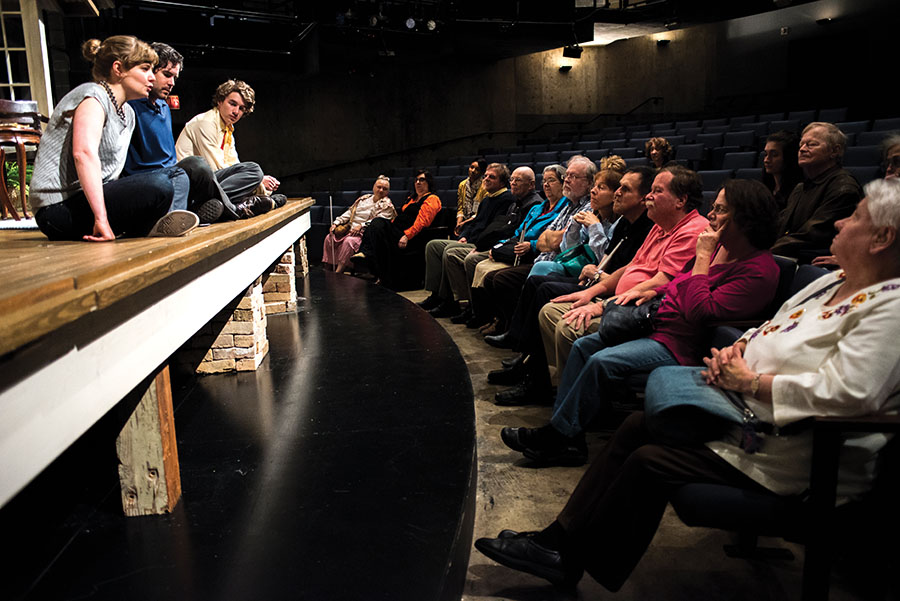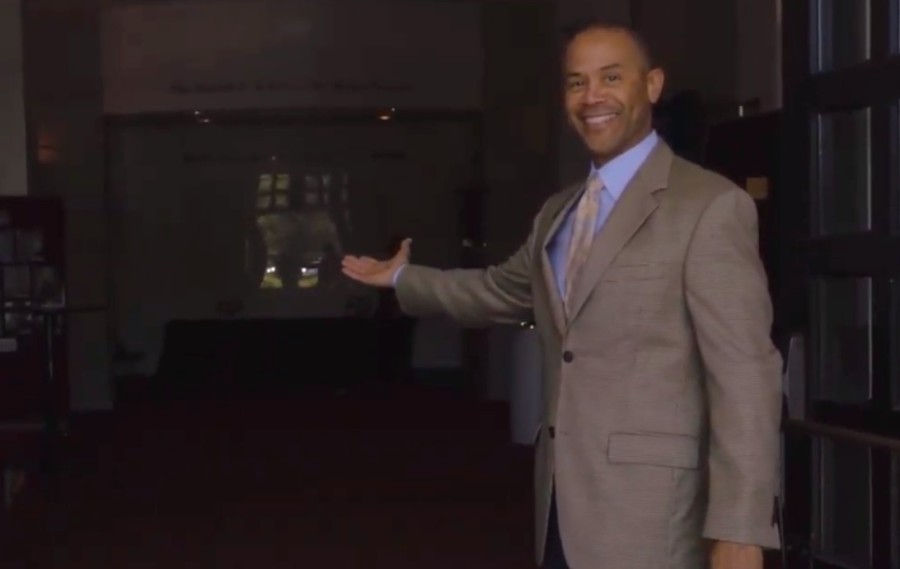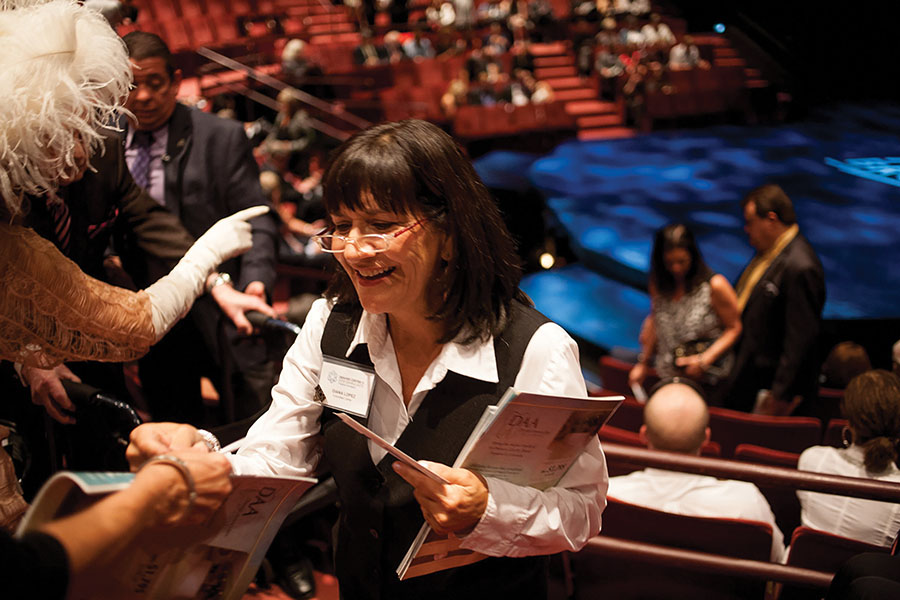Tom Clark, veteran house manager at the Geva Theatre in Rochester, looks back nostalgically to the early years of his four-decade career serving in various front-of-house capacities at several theatres.
“In the old days everything was like a puzzle,” he recalls. “If there was a discrepancy between tickets sold and monies earned you figured it out. You counted and recounted. It was enjoyable; it was our artistic input. Now you just click a button. Technology has taken the fun out of it.”
The impact of technology on theatre operations has indeed been profound, and not simply in matters of financial reconciliation or the way tickets are bought, sold, or verified by ticket-takers with hand-held electronic devices. It’s not even theatregoers’ ubiquitous smart phones, which allow them to text, answer calls, and take pictures during performances. Clark and others believe technology has helped forge a new personality among the theatregoing public that front-of-house staffers—box office personnel, ushers, but most pointedly house managers—have to deal with on an almost daily basis.
“Everyone wants instant gratification,” says Clark. “Years ago, if there was a problem over seating patrons would apologize, assuming it was their fault. That mind-set has changed. Now they assume you did something wrong and you need to fix it right away.”
In all fairness, house managers concede that there are extenuating stressors audiences experience today that did not exist to the same degree years ago: increasing traffic gridlock and unavailable (or absurdly expensive) parking, not to mention the sticker shock of theatre ticket prices and the time crunch that seems to surround all of life, especially in Los Angeles and New York.
The house manager, theatre services director, or director of audience experience, among other titles—not necessarily interchangeable, though there is overlap in job descriptions—comprise the theatre’s first line of defense when something goes wrong, and more usually are entrusted to make sure it doesn’t. They typically oversee a staff of ushers (in most theatres, volunteers) and work in tandem with box office, bars, concessions, safety committees, and security teams. It’s now standard protocol for house managers to meet with the local police precinct for training in the event an “active shooter” arrives on the scene. House managers in turn provide the ushers with a series of dos and don’ts (no heroics is a big one) should the unthinkable occur.
In short: They are liaison, buffer, and intermediary.
“When we did a production of Hair we had a sign posted in the lobby that said the play had sirens, fog, and strobe effects,” says Clark. “One woman told me her husband needed to know more precisely where these lights and noises occurred, because if he was startled he could have very bad medical reaction. I radioed the stage manager for the information and quietly passed it along to the couple. They were prepared and nobody else’s sense of surprise was ruined.”
After a production at Seattle’s ACT Theatre, a troubled male patron approached house manager Becky Plant to complain that the show’s nudity warning was insufficient: It didn’t indicate that it would be male nudity. “In other words,” Plant says, “it was okay with him if it were frontal female nudity.” She changed the sign to indicate which gender would be unclothed, because that’s what house managers do. “We’re still rolling with the punches,” Plant says. “What do audiences want to know and prefer not to know?”
Jay Poindexter, house manager at Asolo Repertory Theatre, in Sarasota, Fla., has had his share of audience finessing to do, most recently after performances of The Cake, a play touching on gay marriage rights. He helps defuse such tensions with an approach he describes as a welcoming committee of one, a familiar and reassuring presence, especially for subscribers, “who come to see me and how I’m dressed,” he says. “I’m known for my bow ties. Some patrons bring me bow ties as gifts. All of that creates a sense of family and community.”
Maintaining that sense of community is pivotal. Following a performance at Chicago’s Steppenwolf Theatre of La Ruta, centering on the abuse and disappearance of women at the Mexican border, Evan Hatfield, the theatre’s director of audience experience, observed several women in the theatre handing out flyers with information about a political prisoner.
“We like inspiring advocacy, and are proud that we’re doing plays that voice important themes,” Hatfield says. But the “bottleneck” the activists were creating at the theatre doors was “disruptive for people who were in that post-play mindset.” While Hatfield let them finish that night (“They weren’t hurting anybody, and trying to stop them would have been more disruptive”), he later spoke to them about confining their leafletting to the sidewalk, as well as suggesting “channels they could take to contact theatre leadership to see if there’s a structured platform for their advocacy.”
Negotiating and facilitating can be complicated in these politically and culturally fraught times. In the play Salt, Pepper, Ketchup, a political drama focused on gentrification from an economic, social, and racial standpoint, a white homesteader cries out that he’s not doing anything wrong, just trying to make a life for himself. In a production last fall at Philadelphia’s InterAct Theatre, some audience members cracked up at this line, enraging others, recalls Erin Washburn, the theatre’s literary and patrons’ service manager. At the intermission a heated argument between two theatregoers erupted.
“Is this play supposed to be funny?” one theatregoer demanded of another, Washburn recalled, enlisting her to back him up in his anger. “My answer was that the play is intended to be polarizing. Responses are individual and while your response is valid, his is valid too. No one should dictate someone else’s response. That seemed to calm him down. Other audience members stared. ‘Well, that was intense,’ one guy said.”

Though it varies with the theatre, the size of staff, the various services provided (from concessions to garage space), not to mention the theatre’s broader mission, the demographics of its audience, and the demands of each particular play, the house manager’s job is fairly routine. A workday can last as long as 14-15 hours, especially on matinee days, or when the theatre hosts special events for patrons and donors.
When Poindexter reports to work at 8:30-9:00 a.m., his first order of business is sorting through emails to keep his usher scheduling up to date. This is a big part of his job: Asolo has 15 teams with a total of 600 volunteer ushers at the ready. Other tasks include detailed-oriented coordination, from setting up the lobby with its ambient music and lighting designed for each show to making sure the brochure displays are well-stacked. All this must be completed before the doors open to the public. Then there are ticketing issues, audio equipment, concerns over heating/air conditioning, and seating latecomers—all in of a day’s (or night’s) work.
None of the half dozen or so veteran house managers I interviewed planned to be house managers. Poindexter majored in drama at college, and performed in regional, Off-Broadway, and Broadway theatre, including six years in Cats. He switched gears to work backstage, serving as dresser at the Metropolitan Opera and Radio City Music Hall. After 14 years, he moved to Sarasota and found himself in his current front-of-house gig, where he feels that all of his skills have coalesced.
At the opposite end of the spectrum is Clark, who grew up thinking he’d work in a bank. “The only thing that’s continued is I count money on a daily basis,” he says.
Unlike Poindexter and some others, who either had theatre or business administration degrees in hand, Clark learned the ropes, apprentice style, and moved up the ranks. Clark did study theatre at SUNY Fredonia, but never graduated, figuring he’d rather just start working. He’s been doing so for 44 years now, in titles ranging from box office manager to customer services manager, at theatres ranging from Corning Summer Theater to Indiana Rep to Yale Rep.
Over those years, Clark and his peers have observed other trends, besides tech-entitled patrons. Most theatres today are committed, in varying degrees, to attracting new—young, ethnically diverse, and physically/emotionally challenged—audiences, some of whom may be unfamiliar with traditional theatre etiquette and/or whose disabilities demand services that may trouble or distract other theatregoers, from feedback-prone audio devices to glaring tablets that offer closed-captioning. And this presents new tasks and opportunities for front-of-house staff to manage expectations and make sure everything goes smoothly.
Theatre patrons with intellectual and emotional challenges, especially those on the autistim spectrum, benefit from “sensory friendly” settings—meaning that house lights may be on throughout the performance and loud noises eliminated. These audience members are often encouraged to move around, voice their feelings, or even leave the theatre for a while and return if and when they’re feeling up to it. Sensory-friendly shows are usually special performances open to patrons on the autism spectrum and their families.
Steppenwolf’s Hatfield also oversees a pre-performance “touch tour” for people who are blind or have low vision, which entails giving those audiences a detailed description of the sets, props, and costumes. They get to tour the set, handle the props, and then meet the actors who describe the characters they play. Hatfield, who defines his job as prioritizing the guests’ experience, with “inclusion” heading the list, is an advocate for arts accessibility programs for people with disabilities. Indeed, he has helped make Chicago theatres a leader in such accessibility services as open captioning and audio description technologies, though he would like to take the technologies further.
“A best practice I’d love to see, and that some storefront theatres like Chimera Ensemble here in Chicago are doing, is for open captioning to be integrated into the set design,” says Hatfield. “That, and the mass adoption of closed captioning, which would allow people with hearing loss to attend any performance instead of being relegated to just one or two dates. This is catching on, via smart glasses like those in development at The National Theatre in London, or the GalaPro technology that delivers captions directly to a guest’s phone, currently in use at Berkeley Rep and a few other regional theatres.”

Less dramatic but equally challenging for house managers are audiences who feel free to talk back to the performers, sing along with them, or photograph them during the show; the latter is forbidden for many reasons, not least endangering the actors. Still, when viewers post their pictures on social media the marketing/advertising value is immeasurable. Front-of-house staff treads a thin line on this one.
“Everybody wants to takes pictures, and we encourage them to do so before or after the show or during the intermission: to hold up a program in front of the stage and say ‘Here I am at the Ahmanson and I love what I’ve just seen,’ and then post it on social media,” says Christine L. Cox, house manager at the Ahmanson Theater in Los Angeles. “The theatre has a ‘step and repeat’ backdrop that names the theatre and show so that viewers can stand in front of it and do selfies. When we produced Come From Away, the team posted a giant map in the lobby, so that audience members could put a pin on the map indicating where they came from. That brings them into the theatrical experience.”
The idea is to bring in new audiences but also to expand the concept of theatre and its environs, says Carol Krueger, theatre services manager at the Denver Center for the Performing Arts. As an example she points to elaborate lobby displays that may even feature actors in character interacting with audiences as they enter the theatre, all of it requiring careful planning. In The Legend of Georgia McBride, Matthew Lopez’s drag farce, the team turned the lobby into a dive bar for the pre-show, then transformed it into a drag club (complete with drag performances) post-show, mirroring the transformation that occurred onstage. The team asked ushers to dress to fit into the world that was being created in the lobby. Front-of-house managers helped train ushers in their new roles while simultaneously keeping up with their usual duties.
The DCPA also offers “Off-Center” programs in found spaces—e.g, a warehouse or hangar—for immersive, experiential, and experimental theatre experiences, specifically designed to attract millennials who may not go to the theatre otherwise, says Charlie Miller, the Off-Center curator.
“We want to push the art form,” he says. “We recognize we have the opportunity to engage a new audience and offer another entrance point for traditional audiences. It’s not conceived as a bridge to the mainstage performances. We recognize that audiences for immersive theatre may not necessarily want to see Macbeth.”
Miller and his front of house/stage managing team (anywhere from 7 to 20) face an array of challenges. Sweet and Lucky, an immersive piece, was set in a darkened, 16,000-square-foot warehouse with 24 darkened spaces where actors and 72-audience members moved about, interacted and created the narrative and characters as the collective improvisation evolved.
“How do we make sure people don’t trip in a dimly lit space?” Miller asks rhetorically. “We also have to think about fire and safety issues. We have to make sure we have enough power and the right permits from the city. There are many logistical challenges. We also have to be handicap accessible and, most important, create a cohesive, artistic experience.”
Miller plans many more large-scale projects, as well as a diminutive piece that will entail one audience member interacting with one actor in an otherwise audience-free space. The house manager’s role in this one remains to be seen.
Even in more traditional theatres the house manager’s future is up for grabs, as theatre aesthetics and practices evolve. Says ACT’s Plant, “Our job is often thankless. People have no idea what we do to keep a show running. But I love it.”
For his part, Clark calls his career “interesting. Like anything there are those moments we would like to forget—mostly when someone wants an explanation for what went wrong, though no excuse is good enough. If I were to give advice to anyone starting out it would be patience. No matter what else you have, you need patience, now more than ever.”
Simi Horwitz is an award-winning journalist based in New York City who writes for Film Journal International and Forward, among other publications.


